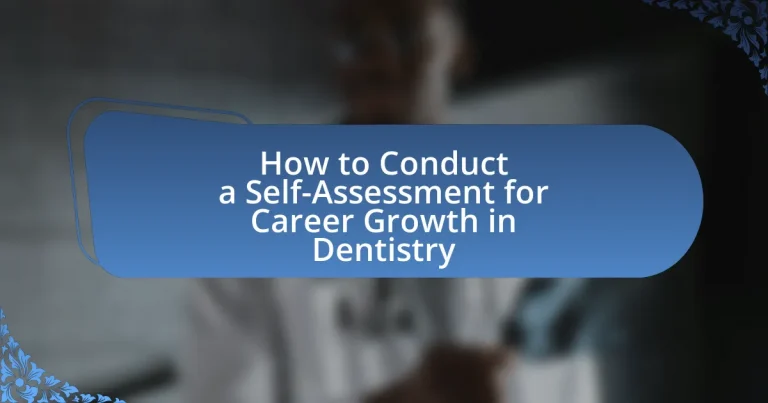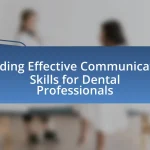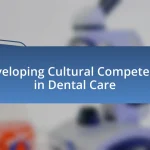A self-assessment for career growth in dentistry is a reflective process that allows dental professionals to evaluate their skills, strengths, weaknesses, and career goals. This article outlines the significance of self-assessment in enhancing clinical competencies and patient care, as well as its role in fostering lifelong learning and adaptability in the evolving dental field. Key components of self-assessment include evaluating clinical skills, patient management abilities, and continuing education, while strategies for conducting effective self-assessments involve gathering feedback, setting realistic goals, and utilizing various evaluation methods. Additionally, the article discusses the importance of reflection and ongoing self-assessment practices for continuous professional development in dentistry.
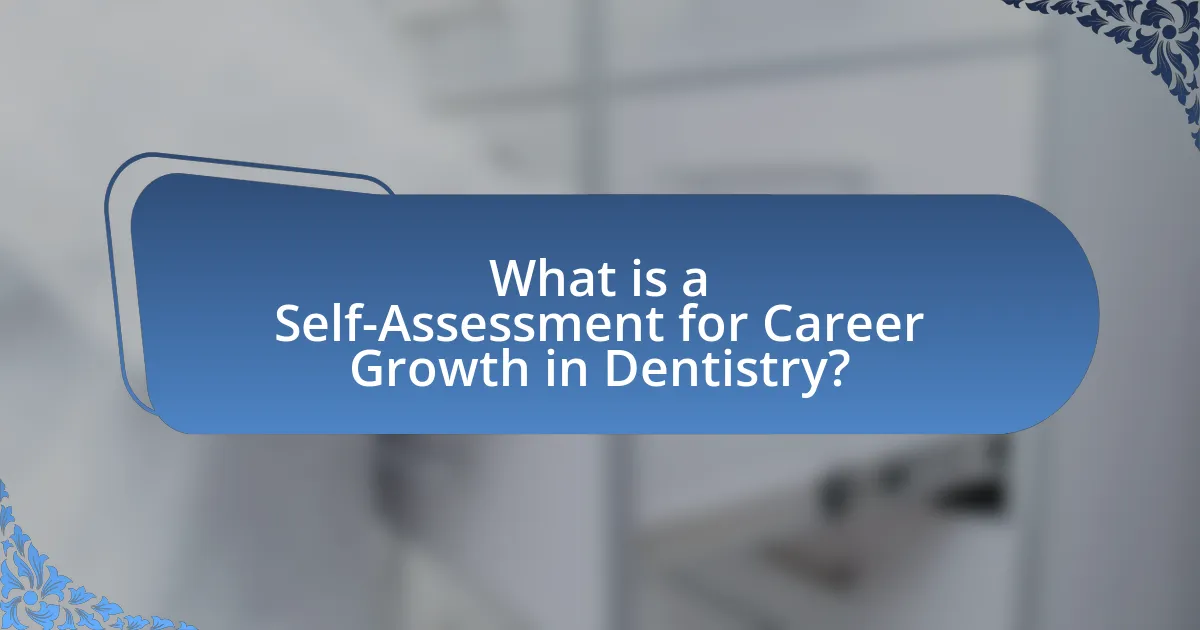
What is a Self-Assessment for Career Growth in Dentistry?
A self-assessment for career growth in dentistry is a reflective process where dental professionals evaluate their skills, strengths, weaknesses, and career goals to identify areas for improvement and development. This process typically involves analyzing clinical competencies, patient management skills, and professional interests, enabling dentists to align their career trajectory with personal aspirations and market demands. Research indicates that self-assessment can lead to enhanced job satisfaction and improved performance, as it encourages continuous learning and adaptation in a rapidly evolving field.
How can self-assessment impact a dental career?
Self-assessment can significantly impact a dental career by enabling practitioners to identify their strengths and weaknesses, which informs their professional development. By regularly evaluating their skills, knowledge, and performance, dental professionals can set targeted goals for improvement, leading to enhanced clinical competencies and better patient care. Research indicates that self-assessment fosters lifelong learning and adaptability, essential traits in the evolving field of dentistry, where new technologies and techniques emerge frequently. For instance, a study published in the Journal of Dental Education found that self-assessment practices among dental students correlated with improved clinical performance and increased confidence in their abilities.
What are the key components of a self-assessment in dentistry?
The key components of a self-assessment in dentistry include evaluating clinical skills, assessing patient management abilities, reflecting on continuing education, and analyzing practice management. Evaluating clinical skills involves reviewing proficiency in procedures and techniques, while assessing patient management abilities focuses on communication and relationship-building with patients. Reflecting on continuing education entails considering completed courses and their relevance to current practice, and analyzing practice management includes reviewing financial performance and operational efficiency. These components collectively help dental professionals identify strengths and areas for improvement, facilitating career growth.
How does self-awareness contribute to career advancement in dentistry?
Self-awareness significantly contributes to career advancement in dentistry by enabling practitioners to identify their strengths and weaknesses, which informs their professional development. By understanding their skills and areas for improvement, dental professionals can pursue targeted training and education, enhancing their clinical competencies and patient care abilities. Research indicates that self-aware individuals are more likely to engage in reflective practice, leading to better decision-making and improved patient outcomes. This proactive approach not only fosters personal growth but also positions dentists for leadership roles and opportunities within their field, as they can effectively communicate their value and adapt to the evolving demands of the dental profession.
Why is self-assessment important for dental professionals?
Self-assessment is important for dental professionals because it enables them to evaluate their skills, knowledge, and performance critically. This reflective practice helps identify areas for improvement, ensuring that dental professionals maintain high standards of care and stay updated with advancements in the field. Research indicates that continuous self-assessment contributes to enhanced clinical competencies and better patient outcomes, as it encourages lifelong learning and professional development.
What role does self-assessment play in identifying strengths and weaknesses?
Self-assessment plays a crucial role in identifying strengths and weaknesses by enabling individuals to reflect on their skills, experiences, and performance. This reflective process allows dental professionals to evaluate their competencies against industry standards and personal goals, leading to a clearer understanding of areas for improvement and areas of expertise. Research indicates that self-assessment can enhance self-awareness, which is essential for professional development; for instance, a study published in the Journal of Dental Education found that self-assessment practices among dental students improved their clinical skills and confidence levels. Thus, self-assessment serves as a foundational tool for career growth in dentistry by facilitating targeted skill enhancement and informed decision-making.
How can self-assessment guide professional development in dentistry?
Self-assessment can guide professional development in dentistry by enabling practitioners to identify their strengths and weaknesses, which informs targeted skill enhancement. By regularly evaluating their clinical competencies, knowledge gaps, and patient management skills, dental professionals can create personalized development plans that align with their career goals. Research indicates that self-reflection leads to improved performance; for instance, a study published in the Journal of Dental Education found that self-assessment practices significantly enhance learning outcomes and clinical skills among dental students. This evidence supports the notion that systematic self-evaluation fosters continuous improvement and professional growth in the field of dentistry.
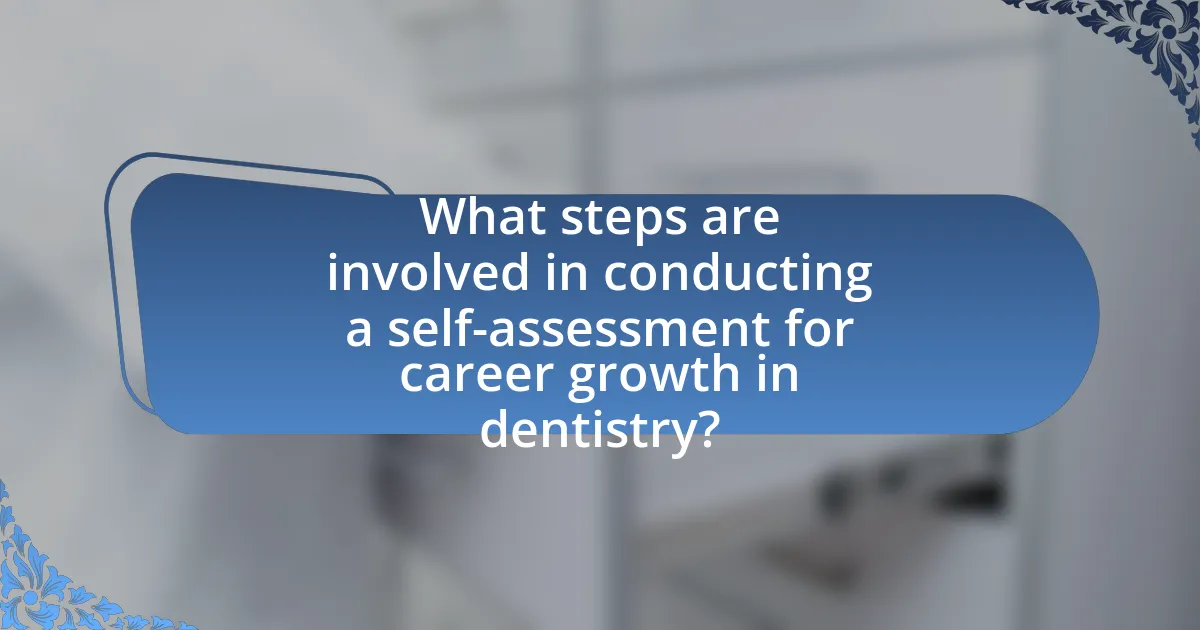
What steps are involved in conducting a self-assessment for career growth in dentistry?
To conduct a self-assessment for career growth in dentistry, follow these steps: First, evaluate your current skills and competencies by listing clinical abilities, communication skills, and areas of expertise. Next, identify your career goals, such as specialization or leadership roles, to align your self-assessment with your aspirations. Then, seek feedback from peers, mentors, or supervisors to gain insights into your performance and areas for improvement. After that, analyze industry trends and demands to understand the skills that are increasingly valuable in the dental field. Finally, create a development plan that includes specific actions, such as pursuing continuing education or networking opportunities, to address identified gaps and enhance your career trajectory.
How do you prepare for a self-assessment?
To prepare for a self-assessment, gather relevant performance data, reflect on personal achievements, and identify areas for improvement. Collect feedback from colleagues and patients to gain diverse perspectives on your skills and contributions. Reviewing professional goals and aligning them with your current performance helps in setting a clear focus for the assessment. According to a study published in the Journal of Dental Education, self-assessment enhances reflective practice, leading to improved clinical skills and patient care outcomes.
What tools and resources can assist in the self-assessment process?
Tools and resources that can assist in the self-assessment process for career growth in dentistry include self-assessment questionnaires, professional development frameworks, and peer feedback mechanisms. Self-assessment questionnaires, such as the Dental Career Development Assessment, help individuals evaluate their skills, interests, and values in relation to their career goals. Professional development frameworks, like the American Dental Association’s Competency Model, provide structured guidelines for assessing competencies required in the dental field. Additionally, peer feedback mechanisms, including 360-degree feedback tools, allow dental professionals to gain insights from colleagues about their performance and areas for improvement. These resources collectively enhance the self-assessment process by providing structured evaluation methods and actionable insights.
How can you set realistic goals based on your self-assessment?
To set realistic goals based on your self-assessment, first evaluate your current skills, strengths, and weaknesses in the context of your career in dentistry. This evaluation should include specific metrics such as patient feedback, clinical performance data, and professional development achievements. For instance, if your self-assessment reveals that you excel in patient communication but struggle with certain technical skills, you can set a goal to enhance those technical skills through targeted training or mentorship. Research indicates that setting SMART goals—Specific, Measurable, Achievable, Relevant, and Time-bound—can significantly improve the likelihood of achieving desired outcomes in professional development. By aligning your goals with your self-assessment findings, you create a clear roadmap for your career growth in dentistry.
What methods can be used to evaluate your skills and competencies?
To evaluate skills and competencies, individuals can utilize methods such as self-reflection, peer feedback, performance reviews, and standardized assessments. Self-reflection involves assessing one’s own experiences and identifying strengths and weaknesses, which is crucial for personal growth. Peer feedback provides insights from colleagues, enhancing understanding of one’s performance in a collaborative environment. Performance reviews, often conducted by supervisors, offer structured evaluations based on specific criteria, helping to identify areas for improvement. Standardized assessments, such as competency exams or skills tests, provide objective measures of proficiency in specific areas. These methods collectively contribute to a comprehensive evaluation of skills and competencies, essential for career growth in dentistry.
How can peer feedback enhance your self-assessment?
Peer feedback enhances self-assessment by providing diverse perspectives that highlight strengths and areas for improvement. When dental professionals receive input from colleagues, they gain insights that may not be apparent through self-reflection alone, leading to a more comprehensive understanding of their skills and performance. Research indicates that peer feedback can increase self-awareness and motivation, as it encourages individuals to reflect critically on their practices and align them with industry standards. For instance, a study published in the Journal of Dental Education found that peer evaluations significantly improved participants’ self-assessment accuracy, demonstrating the value of collaborative feedback in professional development.
What role does continuing education play in self-assessment?
Continuing education plays a crucial role in self-assessment by providing dental professionals with updated knowledge and skills necessary for evaluating their competencies. This ongoing learning process enables practitioners to identify gaps in their expertise and align their practice with current standards and advancements in dentistry. Research indicates that professionals who engage in continuing education are better equipped to assess their performance and make informed decisions about their career development, ultimately leading to improved patient care and professional growth.
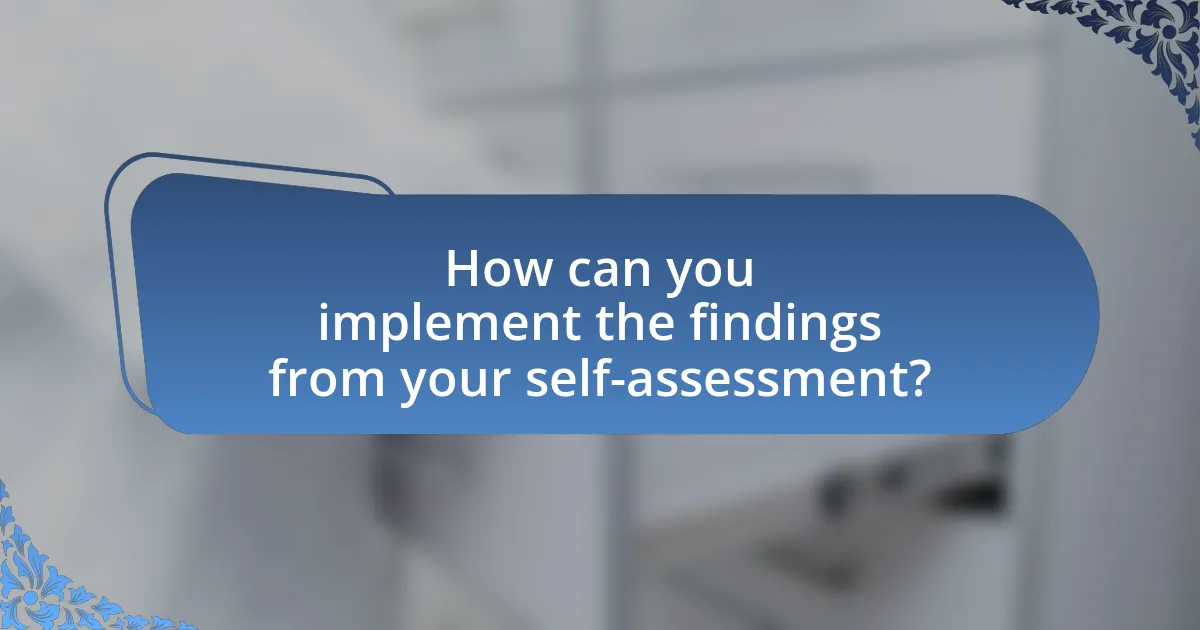
How can you implement the findings from your self-assessment?
To implement the findings from your self-assessment, identify specific areas for improvement and create an actionable plan. For instance, if your self-assessment reveals a need for enhanced communication skills, enroll in workshops or courses focused on effective communication in a dental context. Research indicates that effective communication can significantly improve patient satisfaction and treatment outcomes, as highlighted in a study published in the Journal of Dental Education, which found that communication training led to a 20% increase in patient compliance. By setting measurable goals and regularly reviewing your progress, you can ensure that the insights gained from your self-assessment translate into tangible career growth in dentistry.
What strategies can you use to address identified weaknesses?
To address identified weaknesses in dentistry, practitioners can implement targeted training, seek mentorship, and engage in continuous education. Targeted training focuses on specific skills that require improvement, such as advanced techniques in restorative dentistry or patient communication. Seeking mentorship from experienced colleagues provides guidance and feedback, which can enhance professional growth. Engaging in continuous education through workshops, online courses, or conferences ensures that dentists stay updated with the latest advancements and best practices in the field. These strategies are supported by research indicating that ongoing professional development significantly improves clinical competencies and patient outcomes.
How can you leverage your strengths for career advancement?
To leverage your strengths for career advancement in dentistry, identify your key skills and competencies, such as clinical expertise, communication abilities, or leadership qualities. Once identified, actively seek opportunities that align with these strengths, such as specialized training, mentorship roles, or leadership positions within dental organizations. Research indicates that professionals who align their career paths with their strengths experience higher job satisfaction and performance, as supported by Gallup’s findings that individuals who use their strengths daily are six times more likely to be engaged at work. By strategically applying your strengths, you can enhance your professional reputation and open doors to advancement opportunities.
What are the common challenges faced during self-assessment?
Common challenges faced during self-assessment include a lack of objectivity, difficulty in identifying strengths and weaknesses, and emotional biases. Individuals often struggle to evaluate their performance accurately due to personal biases that cloud judgment, making it hard to recognize areas needing improvement. Research indicates that self-assessment can be skewed by overconfidence or fear of criticism, which further complicates the process. Additionally, time constraints can hinder thorough reflection, leading to incomplete assessments that do not fully capture one’s capabilities or areas for growth.
How can you overcome biases in self-evaluation?
To overcome biases in self-evaluation, individuals should utilize structured frameworks and seek external feedback. Structured frameworks, such as the SWOT analysis (Strengths, Weaknesses, Opportunities, Threats), provide a systematic approach to assess personal performance objectively. Seeking feedback from peers or mentors can offer diverse perspectives, helping to identify blind spots and counteract personal biases. Research indicates that incorporating multiple viewpoints enhances self-awareness and leads to more accurate self-assessments, as evidenced by a study published in the Journal of Applied Psychology, which found that feedback from others significantly improves self-evaluation accuracy.
What support systems can assist in the self-assessment process?
Support systems that can assist in the self-assessment process include mentorship programs, professional development workshops, and peer feedback groups. Mentorship programs provide guidance from experienced professionals who can offer insights into career paths and skill development specific to dentistry. Professional development workshops often focus on enhancing specific competencies and can help individuals identify areas for improvement. Peer feedback groups allow dental professionals to share experiences and receive constructive criticism, fostering a collaborative environment for self-reflection and growth. These systems collectively enhance the self-assessment process by providing structured support and diverse perspectives.
What are the best practices for ongoing self-assessment in dentistry?
The best practices for ongoing self-assessment in dentistry include regularly evaluating clinical skills, seeking feedback from peers and mentors, and engaging in continuing education. Dentists should conduct self-reflections on their patient interactions and treatment outcomes to identify areas for improvement. Utilizing tools such as performance metrics and patient satisfaction surveys can provide concrete data to inform self-assessment. Additionally, participating in professional development activities, such as workshops and seminars, helps to stay updated with advancements in the field, thereby enhancing self-assessment accuracy. These practices are supported by research indicating that continuous self-evaluation leads to improved clinical performance and patient care outcomes.
How often should dental professionals conduct self-assessments?
Dental professionals should conduct self-assessments at least annually. This frequency allows them to evaluate their skills, identify areas for improvement, and align their professional development with current industry standards. Regular self-assessments, supported by guidelines from organizations such as the American Dental Association, emphasize the importance of continuous learning and adaptation in the evolving field of dentistry.
What role does reflection play in continuous career growth?
Reflection plays a crucial role in continuous career growth by enabling individuals to evaluate their experiences, skills, and goals. Through reflection, professionals can identify strengths and weaknesses, leading to informed decisions about future career paths and development opportunities. Research indicates that reflective practices enhance self-awareness, which is essential for setting realistic career objectives and pursuing relevant training or education. For instance, a study published in the Journal of Career Development found that individuals who engage in regular reflection are more likely to achieve their career goals and adapt to changes in their professional environment.
